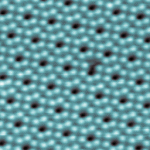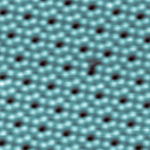Considering that light can either be a wave or a particle, he is quite correct.
Consider that no human has actually saw these particles, we have to rely on technology to do so.
I am amazed that we assume that what we see with technology is actually reality. Or rather some electronic interpretation presented to us in a construct we can understand.
It certainly does not categorically prove that they exist as we assume them to be. In school they show elements with electrons in shells. However, the electron is in all possible positions at once. How can this be?
There also is disagreement within the science community regarding a lot of issues. It really riles me when only one "theory" is presented in forums such as this and all other "theories" are dismissed.
Some of the greatest ideas in our history have been dismissed for being considered nonsense at the time.
Finally, it's worth bearing in mind that everything so far is still only theory. There are no "facts" in science, only probabilities.
To dismiss all other theories because they don't fit into your beliefs is as blind as faith in the theologian church.
A huge number of assumptions are made in psychics, and a good deal of the models presented have inconsistencies and contraindication with each other.
At present there is no universal theory, and personally I don't there ever will be.
And hitting your hand on a table isn't proof that something is sold. Actually, the size of electrons, and the space between them and the nucleus, it's actually not very solid at all. It's other "forces" that prevent your hand (also not very solid at all) from going through the table, not the table itself.
Consider that no human has actually saw these particles, we have to rely on technology to do so.
I am amazed that we assume that what we see with technology is actually reality. Or rather some electronic interpretation presented to us in a construct we can understand.
It certainly does not categorically prove that they exist as we assume them to be. In school they show elements with electrons in shells. However, the electron is in all possible positions at once. How can this be?
There also is disagreement within the science community regarding a lot of issues. It really riles me when only one "theory" is presented in forums such as this and all other "theories" are dismissed.
Some of the greatest ideas in our history have been dismissed for being considered nonsense at the time.
Finally, it's worth bearing in mind that everything so far is still only theory. There are no "facts" in science, only probabilities.
To dismiss all other theories because they don't fit into your beliefs is as blind as faith in the theologian church.
A huge number of assumptions are made in psychics, and a good deal of the models presented have inconsistencies and contraindication with each other.
At present there is no universal theory, and personally I don't there ever will be.
And hitting your hand on a table isn't proof that something is sold. Actually, the size of electrons, and the space between them and the nucleus, it's actually not very solid at all. It's other "forces" that prevent your hand (also not very solid at all) from going through the table, not the table itself.





